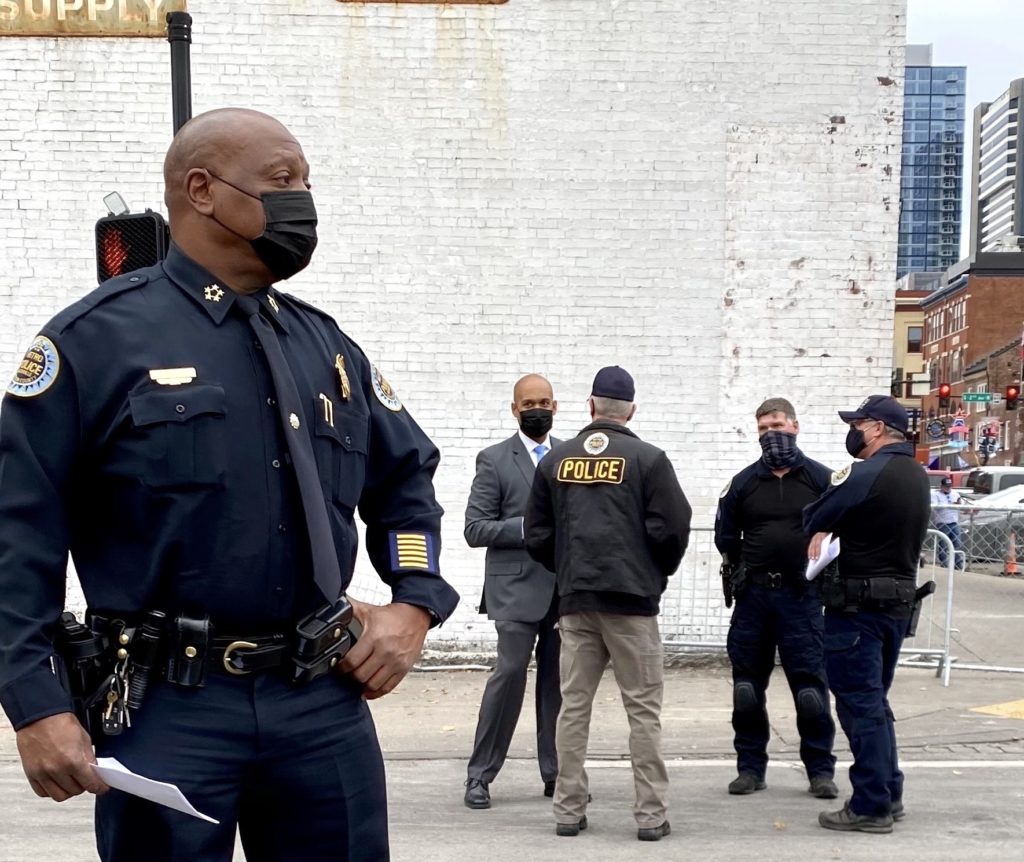
Chief John Drake is making more changes at the Metro Nashville Police Department. Last week, he announced that it will create two additional units.
Reshuffling of the leadership and new policing initiatives have become the norm since he became the department’s leader a little over a year ago. His latest reordering reflects diverging priorities for MNPD.
One of the new divisions is the Police Activities League. It envisions officers coaching sports teams and leading other enrichment activities. Police officials are also planning to partner with community groups and Metro Parks and Recreation.
Drake said in a press release the goal of that program is to foster relationships with kids and their parents, and to steer them away from “bad influences.”
MNPD ran a similar program years ago, called the Police Athletic League. Drake, who was the captain of his high school track and football teams, was assigned to the division back in the 1990s and early 2000s. He has described it as the most rewarding position he has held during his 34 years with the department.
The program was written up multiple times in The Tennessean, including a 1993 story highlighting the league’s Midnight Basketball program, which hosted basketball games from 9 p.m. to 2 a.m. — the hours when it was claimed that most crimes occurred.
That year, six participants received college scholarships and one signed a contract to play basketball professionally in Europe.
“To fill the gaps in the lives of these young men for a lifetime … was at the core of the league’s creation,” founder Stan Marlar told The Tennessean.
But in 2000, the program came under scrutiny when one coach was accused of regularly skipping work and another was arrested after several members of the boxing team accused him of molestation. The league was disbanded several years later.
Now, Drake is bringing it back as part of his community engagement approach to public safety. He says it’s one of three “core pillars,” along with organizational excellence and a concept called “precision policing.”
But precision policing is a fairly new philosophy in law enforcement, without a clear-cut definition. And not much research has been conducted to study its effectiveness. It calls on officers to focus on a small number of people who are believed to be committing most crimes, instead of heavily policing entire communities.
Responsibility for precision policing will fall to the Office of Crime Control Strategies. Drake says it will make sure the department’s many different teams are on the same page about crime trends. The unit will bring together precinct commanders, crime analysts and detectives to respond to “prevalent crime issues,” according to the press release.
Drake said the department also plans to establish a “Real Time Crime Center,” though he did not offer any details.
Focus on homicide, violent crime
The Office of Crime Strategies and Police Activities League join a growing list of new divisions launched under Drake’s leadership.
The chief has created a centralized homicide unit, so detectives stationed across the county can collaborate to solve killings, instead of working independently in separate precincts. He also formed teams to investigate neighborhood shootings and violent crime.
But many of these units were created around the same time that Drake disbanded others, like the juvenile crime task force and crime suppression units, that had been criticized for their aggressive tactics. Neighborhood engagement teams replaced the department’s so-called “flex” units, which sought out crimes in progress, instead of responding to 911 calls.
Drake has promised reforms at the department to make it more modern, transparent and in touch with the needs of the community. Since taking the helm, he has equipped every officer with a body camera after years of delays, signed an agreement with the Community Oversight Board and created a public data dashboard.
However, Drake has also overseen the most violent year for police-community interactions on record, with 10 shootings by Nashville officers in 2021. The chief has declined requests for interviews to discuss the specifics of those cases while investigations are pending.

